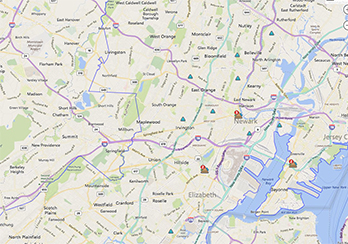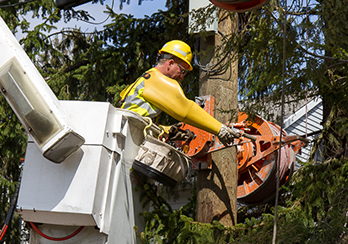During a Storm
Tips to Stay Safe During Severe Weather
Harsh storms often cause hazardous conditions. Protect yourself and your family.
No Power?
Don't assume someone else has reported it. Call 1-800-436-PSEG (7734), text "OUT" to 4PSEG (47734), or report it online.
Electric Safety
- Consider all downed power lines "live" - which means they carry electrical current. Stay at least 30 feet away and immediately call PSE&G at 1-800-436-PSEG (7734) or 911 to report downed wires.
- Don't try to cut or remove trees and brush that are or could become entangled with power lines. A professional tree removal crew will take care of it.
- If you lose power, turn off electric equipment to protect them from power surges caused by restoration. Equipment might include: air conditioners, refrigerators, freezers, televisions, microwaves, and computers.
- Keep one light switch on so you know when the power is restored.
Food and Heat Safety
- Keep refrigerator and freezer doors closed.
- Unopened refrigerators preserve food for several hours.
- Half-full freezers hold food safely up to 24 hours.
- Full freezers preserve food safely between 36 and 48 hours.
- Don't use a gas stove to heat your home. Gas stoves can generate dangerous levels of carbon monoxide and pose a fire hazard if left untended.
Generator Safety
- If you're running a generator or other fuel-powered machine, keep it outside. Carbon monoxide (CO) fumes are odorless and undetectable. A generator operated inside can lead to unconsciousness or death.
- Never connect generators to other power sources like power lines. Utility workers who don't know that a generator is connected are in danger of electrocution.
- For more information about generator safety, click here.
Outdoor Safety
- If you must go outside during the storm, wear thick-soled shoes and watch your step. Flood waters can carry debris like broken glass and nails.
- If you must drive during severe weather, use extra caution at intersections and railroad crossings. Power outages also affect traffic signals.
- If you're in a car and an electric wire falls on it, stay inside the car, call 911 for assistance, and wait for professionals to arrive. First responders (police, fire, OEM, EMS) should not touch the car until PSE&G arrives to de-energize the power line.
Need Immediate Help?
The American Red Cross offers food and water, shelter, and other services to people affected by disasters. Call 211 to connect with local agencies, or apply for disaster assistance at the federal government's Disaster Assistance website.























